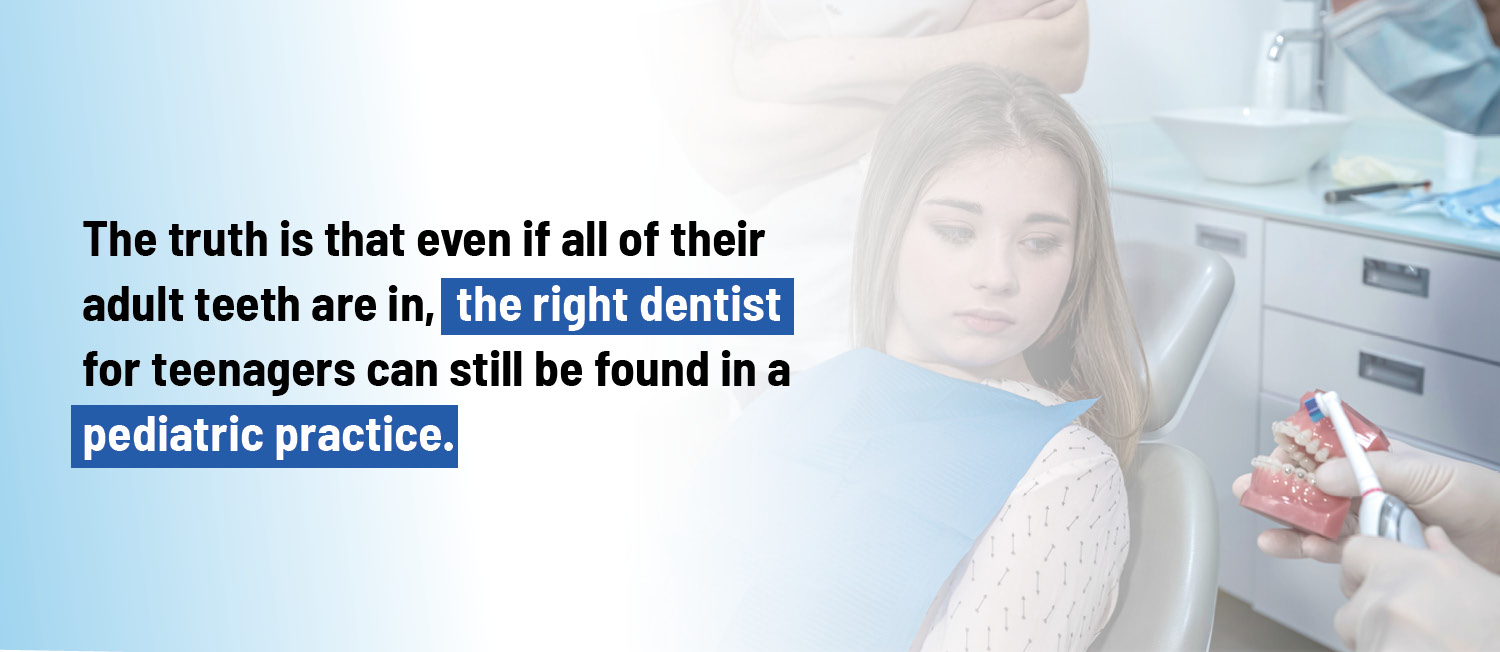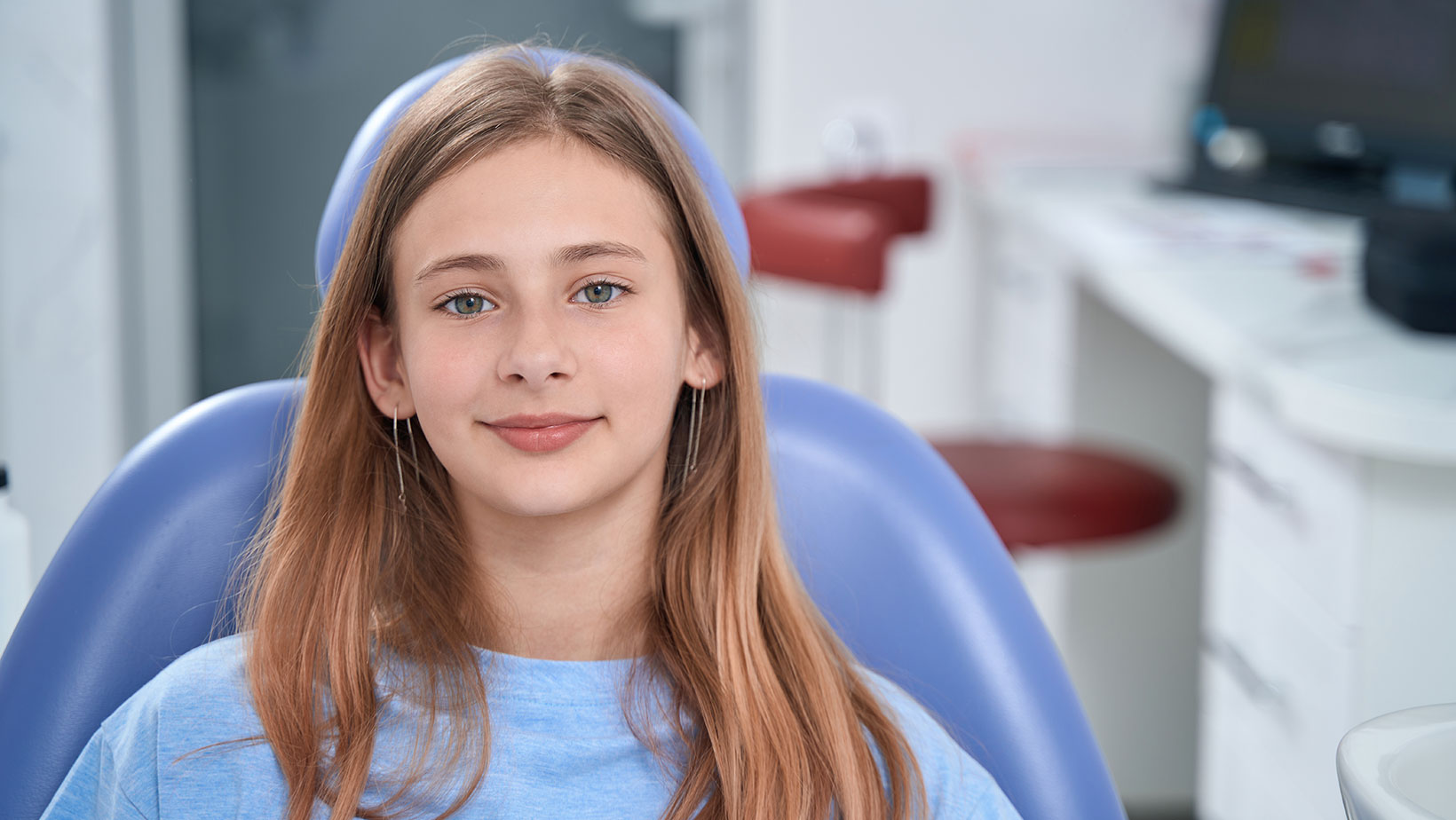It’s no secret that older teens don’t want to sit in a waiting room covered in Mickey Mouse while waiting to see the dentist. After all, they’ve already lost their baby teeth, so why be treated like a baby?
The truth is that even if all of their adult teeth are in, the right dentist for teenagers can still be found in a pediatric practice.
After graduating from dental school, dentists who want to work with children must undergo two additional years of training. This involves learning all about infants and young children’s teeth. It also includes extensive education regarding oral issues in teens. We’ll tell you which issues are most prominent, and when it’s okay to switch to an adult dentist.
Why Teens Should See a Pediatric Dentist vs. a General Dentist
A pediatric dentist is often still the best dentist for teenagers for several reasons:
Their Mouths Are Still Developing
Even if it’s been several years since a child has grown taller, jaw growth does not stop until they’re 18 to 20 years old. Teenagers who have had, or are going through orthodontic treatment will need to be monitored to ensure molars don’t cause crowding or become impacted as the jaw keeps growing. Pediatric dentists and orthodontists have great relationships with each other and can share exam results, X-rays, and any concerns that either one has about oral problems in teen patients.
They’re Likely to Have Cavities
According to the National Institute of Health (NIH), more than half of kids 12 to 19 have oral caries — also known as cavities. Teenagers no longer want mom and dad to monitor their brushing and flossing, and they’re also more likely to drink sugary sodas and sports drinks, leading to cavities when they don’t brush promptly or properly. And if teens have braces, it’s difficult for them to brush effectively around brackets.
Pediatric dentists are well aware of hygiene problems in teenage patients. During regular checkups, they can look for signs of early decay, take X-rays, and ensure that any lingering debris is removed.
Wisdom Teeth Need to Be Monitored
The third molars, also known as wisdom teeth, typically start to come in between ages 17 and 21. While some wisdom teeth don’t cause any problems, many teens experience pain or crowding if they don’t have room for the teeth to erupt. Sometimes, wisdom teeth come in sideways or behind other teeth. According to the American Association of Oral and Maxillofacial Surgeons, 85% of all wisdom teeth will eventually need to be removed.
A dentist for teenagers will monitor incoming wisdom teeth with X-rays even before they erupt. If they become trapped under the jaw or gums, a pediatric dentist can refer your child to an oral surgeon to have them removed.
Their Increased Hormones Can Lead to Gum Disease
Increased hormone levels in teen years can alter the levels of bacteria and blood circulation in the gums. When combined with lax dental hygiene, it’s not uncommon for oral problems in teens to include gingivitis and periodontal disease.
A pediatric dentist will closely look for signs of gum disease and take a proactive approach before issues become severe.

They Are More Likely to Have Sports Injuries
Teenagers are stronger and faster than they were as young children, which means they’re susceptible to harder hits and more severe sports-related injuries. A pediatric dentist for teenagers can fit your older athlete with custom mouthguards to protect their teeth, which is especially important if they have braces.
They May Be Interested In Teeth Whitening
Kids tend to become more concerned with their appearance in their teenage years, leading to an interest in having whiter teeth. Any existing oral health issues like cavities, worn enamel, gum disease, or exposed roots can cause extreme sensitivity when using teeth whitening products with a high concentration of hydrogen peroxide. A dentist for teenagers can examine their teeth to ensure none of these issues exist and can recommend the best whitening treatment that will keep them comfortable while also delivering the best results.
When Is It Time to Switch to a General Dentist?
While there is no specific age to stop going to a pediatric dentist, many teens are ready to transition to a general dentist at age 18 or 19. Unless your pediatric practice has an age limit when patients “age out” of treatment, the following guidelines will help determine when it’s time.
If your child is finished with orthodontic treatment, handles their own oral hygiene responsibly, and their pediatric dentist doesn’t have any pressing concerns, it’s probably time to make the switch. If you don’t already have a general dentist in mind, ask your pediatric dentist for a recommendation.
You can also use our online appointment tool to find a dentist near you.


